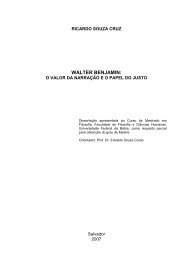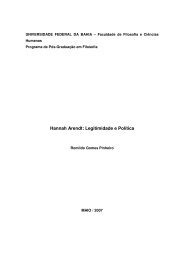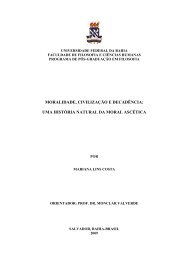ANDREA SCHIMMENTI - Programa de Pós-Graduação em Filosofia ...
ANDREA SCHIMMENTI - Programa de Pós-Graduação em Filosofia ...
ANDREA SCHIMMENTI - Programa de Pós-Graduação em Filosofia ...
Create successful ePaper yourself
Turn your PDF publications into a flip-book with our unique Google optimized e-Paper software.
ABSTRACT<br />
The aim of this study is to un<strong>de</strong>rstand Donald Davidson’s thesis about<br />
the place of mental in a physicalistic conception of the world.<br />
Davidson’s concept of mental, that is part of an explanatory theory of<br />
ordinary life and intentional action, criticizes reductionistic tradition.<br />
According to Davidson, causal efficacy of mental events in physical world,<br />
and autonomy of these events from natural laws, are not necessarily<br />
contradictory i<strong>de</strong>as. In this sense, Davidson thinks that efficacy of thinking<br />
and intention in material world can be reconciled with freedom of reason<br />
from natural laws. It is possible to sustain the i<strong>de</strong>a of mental causality<br />
without <strong>de</strong>fending reductionism, for causal efficacy of mental does not<br />
need to be supported by strict laws, or i<strong>de</strong>ntities between types or mental<br />
and physical proprieties.<br />
Davidson’s i<strong>de</strong>a about mental was <strong>de</strong>fined by some philosophers as a<br />
dualistic concept, for consi<strong>de</strong>ring that irreducibility of intentionality to<br />
natural laws makes the mental into an autonomous dominion. Others think<br />
that Davidson’s i<strong>de</strong>a of mental leads to epiphenomenalism or<br />
eliminativism, for characterizing mental as causally inefficacious in<br />
physical world.<br />
Davidson´s important contribution was his refined try to <strong>de</strong>velop a<br />
holistic theory of mind and action, to support our un<strong>de</strong>rstanding of relation<br />
between our beliefs, <strong>de</strong>sires, intentions, and our actions. In this sense, his<br />
work showed that causality cannot be exclu<strong>de</strong>d from set of concept that<br />
we use to offer <strong>de</strong>scriptions and explanations of relation between our<br />
mental states and our actions.<br />
Keywords: mind, naturalism, physicalism, causality, reductionism.





